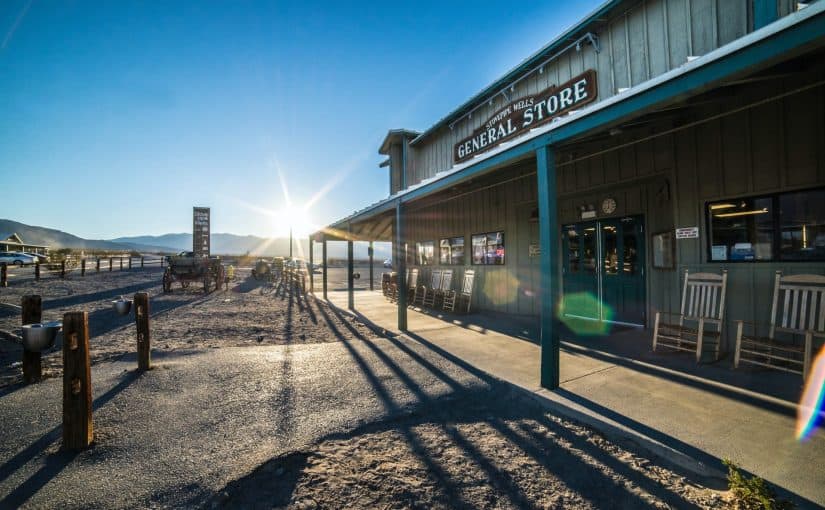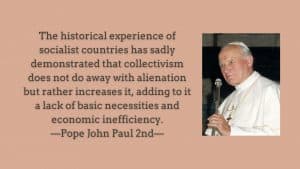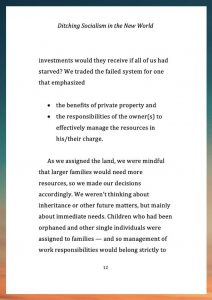A Thanksgiving Bible Study Exploring Issues Raised in “Ditching Socialism in the New World: A Lesson for 21st-Century Americans,” an online article that also is the first chapter in the 3-chapter book Heed the Pilgrims on Socialism and Critical Race Theory.
Take not from the mouth of labor the bread it has earned.
—Thomas Jefferson—
Modern society is hypnotized by socialism. It is prevented by socialism from seeing the mortal danger it is in. And one of the greatest dangers of all is that you have lost all sense of danger, you cannot even see where it’s coming from as it moves swiftly towards you.
—Aleksandr Solzhenitsyn—
An article announcing the availability of this Bible study can be found here.
Please visit this page for three important announcements about this Bible study, and one disclaimer. There you’ll be able to download some special items, including a Bible study overview and a PowerPoint presentation. The Bible isn’t neutral about economic systems. In fact, it speaks with great clarity — and it hits the bull’s eye every time. Today, socialism is widely misunderstood and misrepresented. Now more than ever, we need to shine the light of Scripture on it and expose it for the lie it really is. This study has been designed as a means toward that end (see Col. 2:8; 2 Cor. 10:4-5). History also will help us uncover the truth. I am grateful for your interest in taking this important and enlightening journey. Let’s get started!
Ideally, participants will have read “Ditching Socialism in the New World: A Lesson for 21st-Century Americans” before the Bible study starts. “Ditching Socialism” is chapter 1 of Heed the Pilgrims on Socialism and Critical Race Theory. It is is a paraphrase of Governor William Bradford’s account of the Pilgrims’ failed experiment in socialism that occurred from 1621 to 1623. The article is available online without charge.
Throughout the study, we’ll cite numerous statements from the article and identify them in part by the numbers of the pages on which they appeared in a previously-published booklet. While the booklet no longer is available for purchase, you’ll easily find the parallel material referenced in the Bible study in the online article or in Chapter 1 of Heed the Pilgrims.)
“Ditching Socialism” also is available as an audiobook download, currently without charge. If some or all of the members of your group have not read or heard the article, share this summary, which has been adapted from this brief feature.
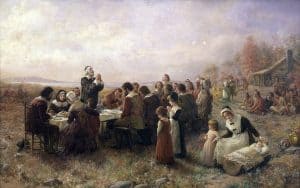
Settlers in both Jamestown and Plymouth initially sought to produce food and wealth according to a communal system sometimes called socialism. Workers contributed the fruits of their labors to a “common store” on which all relied. This approach pushed both settlements to the brink of starvation. Yet when land was assigned and people could reap the benefits of their own work, the communities prospered.
At the Plymouth settlement, the Pilgrims struggled under socialism for two years, but then they “ditched” it and began to operate under a free-market approach. The transformation was both immediate and profound.
Ask participants to turn to page 21 of Heed the Pilgrims (a winter scene is pictured, with an image of Squanto in the upper right-hand corner). Read this portion of the text from pages 21 and 22, or ask a volunteer to read it:
The winter turned to spring, and Squanto became a great encouragement to us, but there was a problem that would plague us the next two years. I come now to the heart of our story. A number of investors in London had financed our voyage to the New World. In turn, they required us to work for them five days out of each week; the remaining two days per week we would be allowed to work for ourselves. After seven years, all profits would be divided equally between us and them. During the five days we worked for them, all our resources had to be held in common. In other words, no private property! No one owned any land or resources of his own. Whatever our team of workers generated had to be put into a common store, and individuals would take what they needed for their livelihoods from that same pool.
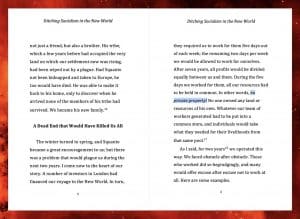
A PDF file of this image is available here.
Emphasize that it is critical for us to understand the meaning and implications of the phrase “no private property.” Write this statement by George Washington on the board or screen, or display it: “Freedom and Property Rights are inseparable. You can’t have one without the other.”
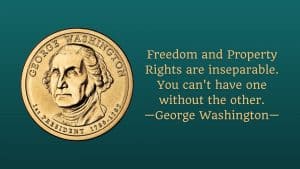
A PDF file of this image is available here.
Indicate that the truth of Washington’s statement hopefully will be made evident as the study moves along. Why is Washington’s observation so important? Here’s why: In the debate over socialism versus free enterprise, property and property rights are linchpin issues. In other words, without property rights, free enterprise could not exist or operate. Let’s put it another way. If you tell me what you believe about private property, I can tell you whether you’re a socialist or an advocate for free enterprise.

A PDF file of this image is available here.
Property and property rights are linchpin issues.
Have the members of your group say it out loud together: “Property and property rights are linchpin issues.” Ask participants to remember this going forward.
Ask: How difficult would it be to live without property rights? To help participants begin to grasp what this would mean, tell them they have a family to provide for and must work. However, they won’t be paid. Their salaries will go to a government pool of money from which government “leaders” will redistribute resources to people in need across the country. But what of those who work and their family members? They can apply for government “benefits,” but they still have to wait for the government to deem them needy and worthy of receiving aid. Meanwhile, you can’t make any money to feed your family on the side, because you can’t own anything; you have no resources with which to start a business or build wealth to meet your own needs and those of your family.
Ask: What will you do? What will your fellow citizens do?

Say: Just as you can’t play Monopoly® or The Game of LIFE® without being able to “own” assets, so, too are you unable to engage in productive work for yourself and those you love without property rights. Ask:What will happen to countries that take this approach?
Highlight the following: It is noteworthy that Karl Marx said this about communism:
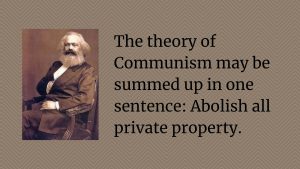
A PDF file of this graphic is available here.
Ask: If someone took your property, would you be angry? Yet there are people in positions of influence today who are eyeing your stuff (or eyeing control of your stuff), and they’re already trying to make you feel happy about their taking it. Ask: Have you seen this from the World Economic Forum? It comes from this video, which was posted on You Tube on December 31, 2020.
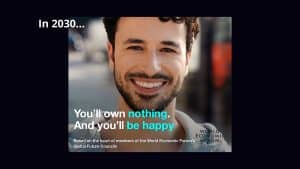
A PDF file of this graphic is available here.
Emphasize: Marx also made these statements (here, here, and here).
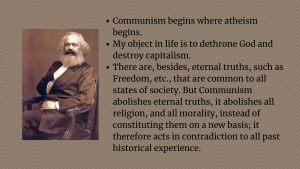
A PDF of this graphic is available here.
Ask: Can you readily can see in the second quote cited in this graphic, that Marx saw a tight connection between God and capitalism, sometimes called free enterprise? Explain: He was correct to see this connection, because there is one — a strong one. The freedom capitalism affords both producers and consumers allows them to demonstrate through their actions that God made them in His image. This is true whether they believe in God or not. They have preferences and can make intelligent, deliberate choices. They do this every day because God created them with, and blessed them with, these abilities. Ardent Marxists may not realize consciously that the free enterprise system showcases evidence for God; but if they don’t, they must sense this reality innately. How else can you explain their hatred of both God and capitalism? We will explore the themes of voluntary transactions and human freedom within the free market economy in just a bit.
Hopefully, you also can see that Marxism, socialism, and communism always have been enemies of Christianity. Marx’s followers understood (and understand) this as well. We’re about to explore a good deal of evidence of Christianity’s being diametrically opposed to Marxism; our evidence will consist of strong biblical support for the free enterprise system.
Antonio Gramsci, an Italian Marxist who lived from 1891 to 1937, said,
Socialism is precisely the religion that must overwhelm Christianity.…In the new order, Socialism will triumph by first capturing the culture via infiltration of schools, universities, churches and the media by transforming the consciousness of society.
Does any of this sound familiar?
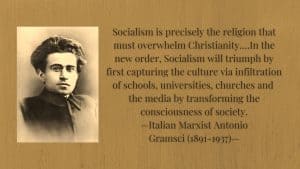
A PDF of this graphic is available here.
The Bible and Capitalism
Say: We see God’s “fingerprints” all over the free enterprise economic system. In our brief study, we will look at biblical support for four essential components of the free market —
-
-
-
- diligent and productive work,
- rewards for work,
- voluntary transactions, and
- property rights.
-
-
All of these are connected — and all of them are essential to the free enterprise economic model. Of course, free enterprise involves more than these four elements, but this introductory study will explore these four.
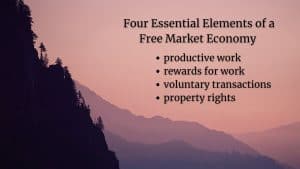
A PDF file of this graphic of this image is available here.
→ 1. Productive Work
Say: The Bible affirms and upholds all four of these elements. We’ll return to the matter of property rights in just a bit, but for the time being, let’s see how hard work fits into the mix.
Distribute this worksheet to each participant and say, “Here are seven of many Old Testament passages we could cite that showcase the Bible’s affirmation of hard work.” Here are these verses online.
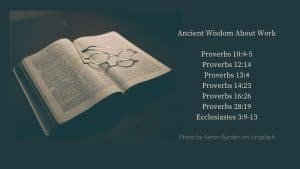
A PDF file of this slide is available here.
Give participants a few minutes to complete the exercise. Then briefly discuss it, asking volunteers to share the insights and ideas they wrote. You may wish to write on the board or screen some the descriptive words members of your group mention. These may be among them.
industrious • productive • responsible • reliable • trustworthy • dependable • mature • motivated • someone with purpose • tireless
Ask and briefly discuss: Are these considered compliments today? To the degree that they’re not, how can we make them fashionable and desirable qualities once more?
Note that while the free enterprise system sets the stage for people operating within it to work hard; the communal system, or socialism, breeds laziness and envy. It also produces misery. From page 22 of Heed the Pilgrims, highlight the following realities the Pilgrims faced under the socialist system. Having a common store from which everyone was supposed to contribute and draw produced these results.
-
-
- The young unmarried men — those who were strongest and who had the most time and the greatest ability to produce — resented that they were, in effect, being made to work for other men’s wives and children, without any additional compensation.
- Whether strong or weak, everyone working, whether he did much or little, would wind up with the same amount of food and other resources as everyone else. If an individual worked a full eight hours in a day, and another worked only two, each received the same. Those carrying the greater load strongly believed this to be an extreme injustice. Can you blame them?
- Experience counted for nothing; the older men felt disrespected by those who were younger.
- Under the communal arrangement, the wives had to cook and do laundry for anyone and everyone — not just their own husbands and families. This angered the husbands, who, along with their wives, felt it was a form of slavery.
-
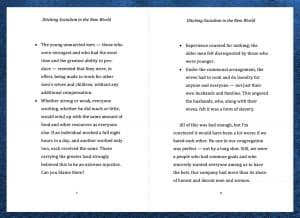
A PDF file of this image is available here.
Winston Churchill was right when he said, “Socialism is a philosophy of failure, the creed of ignorance, and the gospel of envy, its inherent virtue is the equal sharing of misery.”
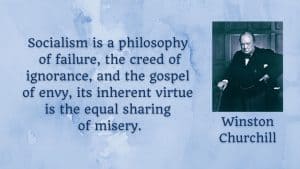
Ask participants to number off 1-7. The number after the first “number 7” will be a second “number 1,” and so on, until everyone has a number. Ask each one to read silently the verse or verses assigned to his or her number on the worksheet from the previous exercise. (You can display passages on the previous slide listing them or on this slide.) If desired, ask participants to get in groups according to their assigned numbers, and to discuss answers to the questions you raise.
Ask each participant to look in his or her assigned passage (or ask groups to look) for indications of compensation for having worked hard, or consequences for having not worked. As time allows, take each passage in turn and discuss it, highlighting both positive and negative results of actions and inactions. If desired, list responses on the board or screen. Emphasize that these are the realities of a free enterprise system. A person doesn’t have to work, but if he or she doesn’t, consequences ensue.
Emphasize that the New Testament commends work as well as the Old Testament. Highlight the principle we see in 2 Thessalonians 3:10: Paul wrote to the Thessalonians Christians, “For even when we were with you, we commanded you this: If anyone will not work, neither shall he eat.”
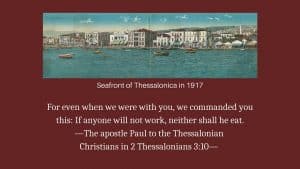
A PDF file of this graphic is available here.
Ask:
-
-
- Is this harsh? Why or why not? Is it fair? Is it just? In other words, is justice served through enforcement of such a policy?
- What are the benefits and potential benefits of having and enforcing this policy?
- What are the costs and potential costs of not upholding and enforcing it?
- Point out that many today would say such a policy is lacking in compassion, but how compassionate would it be to reward laziness?
- Note that Paul did not say “If anyone doesn’t work…” but “If anyone will not work” (emphasis added). Some cannot work for various reasons. Paul was not saying they should be denied food.
-
Discuss: Why might this seem harsh, despite the fact it targets laziness and sloth? We live in a day when incentives for taking responsibility are deemed harsh and unfair, and we need to change that! We hear a great deal about injustice today, and usually the point being made is how much people lack. Have they been treated unfairly? Maybe so, but maybe not. This is the point we’re making here: In those specific instances when people who can work refuse to work, shouldn’t they lack? In such cases, this is true justice!
Turn a corner. Say: Let’s return to the idea that in free market economies, those who work hard are rewarded. Ask: Other than pay, what rewards are associated with a job well done?
Point out that on page 25 of Heed the Pilgrims, Governor Bradford talks about how restoring private property rights and changing over to a free market system transformed the Plymouth settlement.
The change was remarkable and immediate! Whereas before the men in our company had looked for excuses not to work and had complained when they did, they now labored willingly and eagerly. More corn was planted than would have been under any other system I or anyone else could have devised. It wasn’t just the men, either! Wives and children also worked in the fields, and they apparently wanted to! Before we adopted this system, urging a woman to till the ground and plant corn was thought to be oppressive and mean.
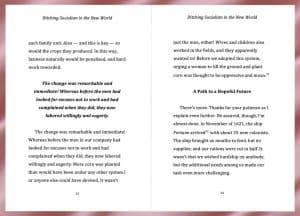
A PDF file of this image is available here.
Pope John Paul 2nd was familiar with communism and socialism because of their grip on his native Poland. He said,
The historical experience of socialist countries has sadly demonstrated that collectivism does not do away with alienation but rather increases it, adding to it a lack of basic necessities and economic inefficiency.
→ 3. Voluntary Transactions
Explain that Jesus’ teachings assume a free enterprise market economy. Say: Let’s look at several of His parables. Divide the large group into six smaller groups (or fewer, depending on the size of your large group). Give each one one of these assignments. (Go here for the Bible passages online.) Give groups a few minutes to discuss their assigned passage(s) and to respond to the questions at the bottom of their assignment sheets. Ask each group to appoint a willing spokesperson to report the group’s findings.
After Group 6 has reported (or during the report Group 6 gives), share this graphic, which showcases the first part of Matthew 20:15. (If you don’t have a sixth group, briefly summarize the parable in Matthew 20:1-16. Or, ahead of time, you can make sure that one of your groups is given the assignment sheet for Group 6.)
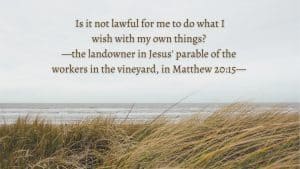
A PDF file of this graphic is available here.
Explain: Although Jesus’ parable is not primarily about economics, it still implicitly affirms economic freedom and God’s intention that people enjoy such freedom. This is the freedom that the free enterprise system affords all its participants. Note how it was manifested among the Pilgrims on page 28 of Heed the Pilgrims:
After the newcomers joined us, it wasn’t that long until it was time to harvest our crops. We reaped a bountiful harvest that year, certainly because God had been good to us, but also because the members of the colony had worked hard in both planting and harvesting.
In fact, we enjoyed more than enough! Some members of the colony even were able to benefit others because they had enough to sell. Also, through their transactions, they managed to benefit themselves as well by making a profit. Having worked hard, they deserved it!
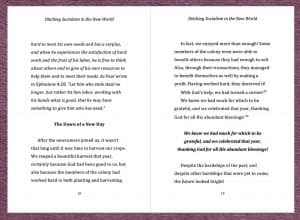
A PDF file of this image is available here.
Say: Let’s return now to the landowner’s rhetorical question in Matthew 20:15: “Is it not lawful for me to do what I wish with my own things?” Briefly discuss the implications of this question with regard to God’s perspective on economic systems. (The members of Group 6 may have covered some of these items in their report.) Scripture may uphold the following elements implicitly, but it upholds them nonetheless.
-
-
- Personal choice is endorsed.
- Government’s role of protecting rights is supported. The landowner said, “Is it not lawful for me to do what I wish with my own things?” (emphasis added).
- Private property is fully acknowledged.
- Management of private property is implicitly, yet strongly, sanctioned.
-
Say: Generally speaking, these elements also are evident in Acts 5:1-11. This is especially significant in light of Acts 2:44-45 and 4:34-35, passages that some advocates of socialist policies use to make the case the early church practiced socialism. A close examination of what Luke wrote in Acts 2 and 4 refutes these claims. All three of these passages are printed on this handout. Give a copy to each participant and discuss reasons why the early church didn’t practice socialism at all. (See the information at the bottom of the handout. If desired and if time allows, refer to this article).
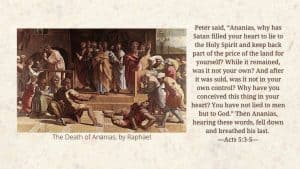
A PDF file of this image is available here.
→ 4. Property Rights Are a Linchpin Issue
Say: We return now to property and property rights, which are — what? Say it together — linchpin issues!
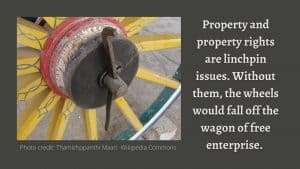
A PDF file of this slide is available here.
Bradford writes this on page 24 of Heed the Pilgrims:
We traded the failed system for one that emphasized
-
-
-
- the benefits of private property and
- the responsibilities of the owner(s) to effectively manage the resources in his/their charge.
-
-
A PDF file of this image is available here.
Say: In both the Old Testament and the New Testament, Scripture upholds the right to own and use property as one sees fit. We’ve just looked at one passage that does this: Acts 5:1-11. Let’s look at a few additional passages.
In the Ten Commandments, the Eighth and Tenth Commandments speak directly to property ownership and property rights.
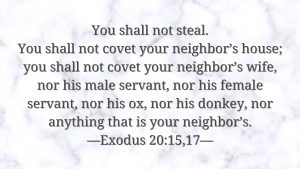
A PDF file of this graphic is available here.
Observe: Stealing would not be stealing if property were not privately owned or managed. Coveting occurs when an individual isn’t content with what he owns and obsesses over someone else’s possessions. Ask: How many possessive nouns and pronouns do we see in verse 17? (In English, seven.) Note that possessive nouns and pronouns denote ownership.
Explain that we see property rights in Scripture as early as Genesis 23, and the portrait presented is not ambiguous. It includes not only the element of ownership of property and wealth, but also the element of exercising freedom to exchange one’s possessions or wealth for something else.
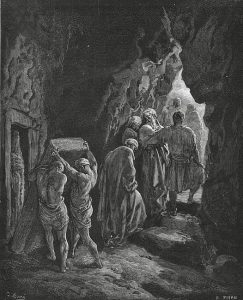
Distribute this discussion guide to all your participants. Summarize the events recorded in Genesis 23. Use this information to help you in your discussion of question #1 at the bottom of the discussion guide. (Question 2 is provided for additional discussion later, if desired.)
Summary: Sarah, Abraham’s wife, has lived for 127 years, and she dies. Abraham wishes to bury Sarah in a certain cave, but he is a foreigner in that land. He negotiates with Ephron, the owner of the cave and the field in which the cave is located, a fair price for the property. The negotiation takes place in the presence of “the people of the land, the sons of Heth” (v. 7). As we noted in the Word Foundations article titled “The Bible and Free Enterprise, Part 3” (emphases added),
After “Abraham weighed out the silver for Ephron which he had named in the hearing of the sons of Heth” (v. 16) and paid him, the property was “deeded to Abraham as a possession” (vv. 17-18). Following the transaction, the money that previously had belonged to Abraham was Ephron’s, and the field that earlier been Ephram’s now belonged to Abraham.
It is difficult to overemphasize the importance of this passage of Scripture. Hear what historian David Barton says about it in the following brief clip from the February 6, 2020 episode of Walbuilders Live! The first voice you’ll hear will be that of co-host Rick Green.
Turn a corner. Say: Now let’s look at the New Testament. In addition to Acts 5:1-11, which we’ve already mentioned, consider the parables of Jesus we’ve already discussed when we talked about economic freedom and voluntary transactions when we considered point #3. These parables also implicitly affirm property rights — both the right to own property and wealth and the right to manage it. Some of them also emphasize the responsibility people have to manage the resources they own. Briefly discuss examples of ways the parables cited in point #3 do these things.
Many of Jesus parables implicitly affirm both the right to own and the right to manage property and wealth. His parables also underscore the responsibility people have to manage property wisely and well.
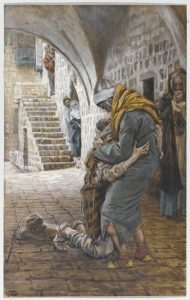
If desired and if time allows, discuss three parables you’ve not yet talked about with regard to property rights. All three can be found in Luke 15:
-
-
- the parable of the lost sheep in Luke 15:4-7,
- the parable of the lost coin in verses 8-10, and
- the parable of the lost son in verses 11-32.
-
In the parable of the lost son, numerous elements of the free enterprise system are evident. These include one’s use of wealth, choices made about how to use it (wise choices vs. unwise ones), employment, wages, poverty, and so forth.
Make clear again that the primary meaning in each of these parables is not related to property or property rights. Even so, the elements in these parables that do relate to property rights still are instructive for us (just as similar elements in the other parables also were instructive). Jesus took ideas and concepts people understood (including elements of the free enterprise system) and wove them into stories that pointed to powerful spiritual truths.
Summing Up
Say: Let’s examine one more verse, the one mentioned on page 27 of Heed the Pilgrims. The following quote begins in the Editor’s note.
The tendencies to look out for oneself and to view others skeptically are natural. But the “other side of this same coin” is that with enough to go around, generosity can be encouraged and joyfully practiced. When a person has worked hard to meet his own needs and has a surplus, and when he experiences the satisfaction of hard work and the fruit of his labor, he is free to think about others and to give of his own resources to help them and to meet their needs. As Paul wrote in Ephesians 4:28, “Let him who stole steal no longer, but rather let him labor, working with his hands what is good, that he may have something to give him who has need.”
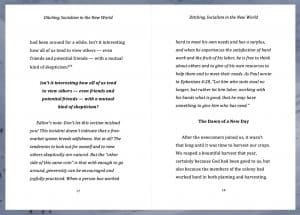
A PDF file of this graphic is available here.
In Ephesians 4:28, Paul wrote, “Let him who stole steal no longer, but rather let him labor, working with his hands what is good, that he may have something to give him who has need.”
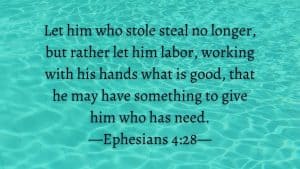
A PDF file of this graphic is available here.
Point out that in this verse we see many elements of free enterprise upheld, and consequently, socialism destroyed at its very foundation.
-
-
- no stealing (thus respecting others and their rights over their own property)
- engaging in constructive work
- engaging in productive work
- enjoying the fruits of one’s labor
- private property rights—The verb translated he may have means to own or possess.
- encouragement but not coercion to give to those in need
- treating others with dignity and respect, an innate recognition of all people as made by God in His image
-
Free Enterprise Recognizes God’s Role in Life; Socialism Enthrones Government as God
Note on page 28 of Heed the Pilgrims that Bradford writes, “We knew we had much for which to be grateful, and we celebrated that year, thanking God for all His abundant blessings!”26

A PDF file of this image is available here.
Note the number 26, a footnote. On page 71 the footnote is recorded. It says,
26D. James Kennedy and Jerry Newcombe, What If Jesus Had Never Been Born? (Nashville: Thomas Nelson,1994), 121-122. Kennedy and Newcombe write,
The result [of the Pilgrims’ adaption of a free market system] was that the following harvest was a tremendous, bountiful harvest, and abundant thanksgiving was celebrated in America. Had they not gone into private enterprise, it is likely the Pilgrims would have died off. Note it well: When socialism was abandoned, Thanksgiving was established! When socialism is reinstated in America, thanksgiving will be abolished! That is the history of America — a lesson that we have all too easily forgotten.
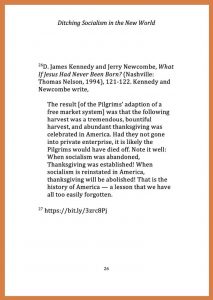
A PDF file of this image is available here.
Mark it down: With socialism, government becomes god. In a free market economy, people are free to realize God has enabled them to work and produce wealth, and they are free to recognize He also has blessed them from His benevolent hand.
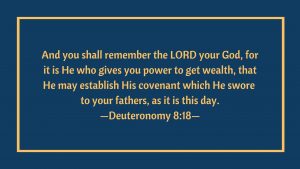
A PDF file of this image is available here.
This Thanksgiving, thank God for the free enterprise economic system. Further, resolve to speak up to defend it and protect it.
Socialism is an ever-present and increasingly dangerous threat. Because of its compassionate-sounding and benevolent-sounding rhetoric, it continues to gain favorability, especially among the young and among those without a biblical worldview.
As Christians, we must uphold a biblical worldview. This includes understanding and warning people about the dangers of socialism, and defending the free market approach.
Let’s remember how William Bradford concluded his report. On page 28 he wrote, “I shudder to think what would have become of us if we hadn’t ditched socialism!”
I shudder to think what would have become of us if we hadn’t ditched socialism!
—William Bradford, paraphrased—
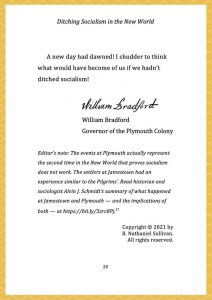
A PDF file of this image is available here.
Likewise, I shudder to think what will become of us today if we, as Americans in the 21st century, don’t “heed the Pilgrims” on this important matter.
Together, let’s make sure we emulate them! Nothing less than our liberty is at stake!
Copyright © 2021 by B. Nathaniel Sullivan. All rights reserved.
Learn More!
To access a six-session Bible study series, Principles of Economic Liberty: The Biblical Case for Free Enterprise, visit
discoverbedrocktruth.org/freemarketbiblestudy.
For further reflection and discussion:
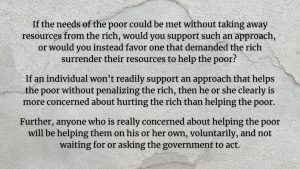
A PDF file of this image is available here.
Unless otherwise indicated, Scripture has been taken from the New King James Version®. Copyright © 1982 by Thomas Nelson, Inc. Used by permission. All rights reserved.
top image credit: Photo by Chor Tsang on Unsplash
